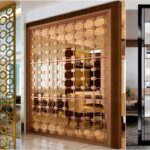Today, office spaces demand smart and functional designs that enhance productivity while maintaining a professional aesthetic. One crucial aspect of office design is selecting the right partition door design to balance privacy, accessibility, and style. Whether it’s for meeting rooms, cabins, or collaborative spaces, the right choice can improve workflow and space utilisation. The following is a detailed post on the factors to consider when selecting the most suitable partition door for an office.
Understanding the Importance of Partition Doors
Partition doors help divide office space efficiently while ensuring flexibility. They also reduce noise, provide privacy, and enhance visual appeal, making them a key element of modern office design. The right Partition Door Design depends on the office layout, available space, and intended use.
Assessing Office Space and Layout
Every office has a unique layout, so understanding spatial requirements is crucial before selecting a door type.
- Space Optimisation: Offices with limited space benefit from sliding or bi-fold doors as they do not need extra clearance for opening.
- Traffic Flow: High-traffic areas require doors that open smoothly without causing obstructions.
- Lighting and Ventilation: Glass doors allow natural light to pass through, creating an open and well-lit environment.
Types of Partition Doors for Offices
Choosing the right type of door can enhance both functionality and aesthetics. Different options suit different office layouts and needs.
Sliding Partition Doors
Sliding doors are popular in modern office designs due to their space-saving benefits.
- They move along a track, eliminating the need for extra space for swinging doors.
- They can complement different office interiors in glass, wood, or aluminium.
- Sliding doors improve accessibility and create a seamless transition between spaces.
Folding Doors for Flexible Spaces
Folding doors are ideal for offices that require flexible partitions.
- They fold away, allowing a room to be opened or closed as needed.
- Glass folding doors maintain openness while offering privacy when necessary.
- These doors are useful in meeting rooms, conference halls, and co-working spaces.
Must Read: How to Pick the Best Sliding Door Design for Your Home?
Hinged Doors for Traditional Setups
Hinged doors are the most common choice for offices with dedicated rooms and cabins.
- They provide a secure and soundproof environment for confidential discussions.
- They can match different office themes in wood, metal, or glass.
- Hinged doors work best in spaces where there is enough clearance for opening and closing.
Material Considerations for Partition Doors
The material of the door affects its durability, aesthetics, and maintenance.
Glass Doors for a Modern Look
Glass doors create a sleek and professional atmosphere in office spaces.
- They allow natural light to flow, reducing the need for artificial lighting.
- Frosted or tinted glass can enhance privacy without blocking visibility completely.
- Glass doors are easy to clean and maintain, making them a low-maintenance option.
Wooden Doors for a Classic Touch
Wooden doors add warmth and sophistication to an office setting.
- They provide a sense of privacy and are effective for noise reduction.
- Wooden doors can be customised with different finishes to suit office interiors.
- They require periodic maintenance to prevent wear and tear.
Aluminium Doors for Durability
Aluminium doors are a practical choice for high-traffic office areas.
- They are lightweight, corrosion-resistant, and highly durable.
- Their sleek design blends well with modern Window Door Design concepts.
- Aluminium frames paired with glass panels offer a combination of strength and transparency.
Integrating Partition Doors with Office Aesthetics
A well-chosen partition door design should blend seamlessly with the overall office décor.
- Colour and Finish: The door colour should match the office’s theme, whether it’s a corporate or creative environment.
- Branding Elements: Some offices incorporate company logos or designs on glass partition doors.
- Consistency: Ensuring that doors complement all window door designs, maintaining a cohesive look throughout the office.
Functionality and Ease of Maintenance
While aesthetics matter, the practicality of the partition door is equally important.
- Ease of Operation: Doors should open and close smoothly without excessive effort.
- Soundproofing Needs: Some office areas, such as conference rooms, need soundproof doors to prevent distractions.
- Maintenance Requirements: Materials like aluminium and glass require minimal upkeep compared to wooden doors.
Security and Privacy Considerations
The right partition door design should provide a balance between openness and confidentiality.
- Locking Mechanisms: Private cabins and meeting rooms may require lockable doors.
- Frosted or Tinted Glass: These options maintain privacy while still allowing light to pass through.
- Smart Access Systems: Some offices opt for digital access doors for added security and convenience.
Conclusion
Choosing the perfect partition door design involves considering office space, functionality, aesthetics, and maintenance. Sliding and folding doors are excellent for flexibility, while hinged doors offer a more traditional approach. Materials such as glass, wood, and aluminium each have their advantages, making it essential to select one that aligns with office requirements. Ensuring that the door complements modern window door design elements creates a visually appealing and practical office environment. With careful selection, businesses can create a functional and stylish office space.

